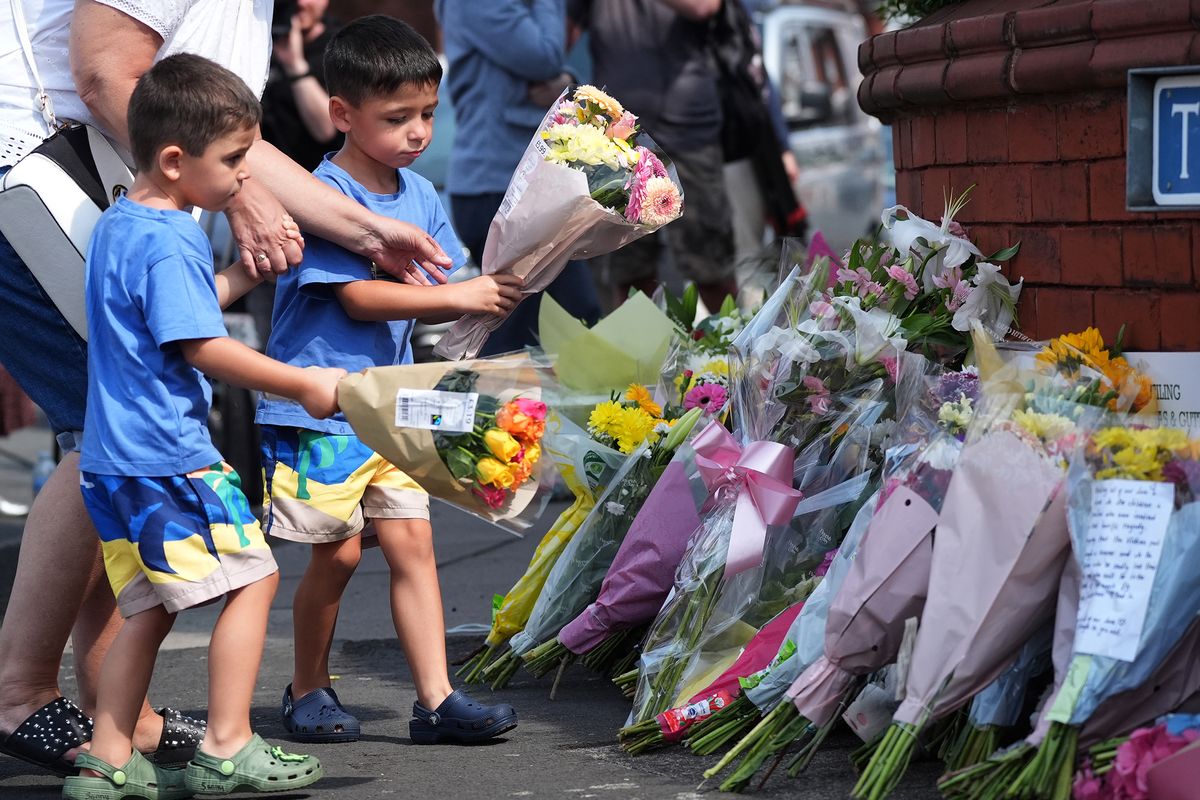Violent protests grip English cities in wake of knife attack at dance class

Violence erupted in several English cities Saturday amid anti-immigrant protests as crowds of far-right activists scuffled with police and counterprotesters in the northern cities of Liverpool, Hull and Nottingham, among other locations.
Tensions have simmered in some communities across Britain in the wake of a stabbing in the northern town of Southport on Monday after misinformation over the identity of the attacker swirled online. The knife attack at a Taylor Swift-themed dance and yoga class for elementary school-age girls stunned Britain and ignited days of anti-immigrant riots in multiple cities that were incited by far-right provocateurs. Increasingly, the demonstrations have drawn counterprotests in communities across the country.
Prime Minister Keir Starmer gathered senior ministers Saturday afternoon to discuss the violence, according to a spokesperson for his office. Starmer said police had full support from the government “to take action against extremists on our streets who are attacking police officers, disrupting local businesses and attempting to sow hate by intimidating communities.”
In Liverpool, a city near Southport, police vehicles were damaged as protesters threw bricks and chanted “stop the boats” – a reference to asylum-seekers who arrive in small boats in the English Channel – and antifascist groups confronted them Saturday. Two police officers were taken to the hospital with injuries, the Merseyside Police, the force responsible for the region, said in a statement Saturday.
“The behavior we have seen today in Liverpool city center is completely unacceptable,” Jenny Sims, assistant chief constable for Merseyside Police, said in a statement. “What should have been a sunny Saturday on the historic waterfront to be enjoyed by people of all ages turned into an afternoon of unashamed disorder and violence, which potentially put decent members of the public, including children, at risk.”
At least six people had been arrested by Saturday evening on suspicion of violent disorder and criminal damage, among other violations, and the number of arrests are likely to increase, police said.
In Leeds, right-wing protesters scuffled with anti-racist protesters, although the situation remained largely peaceful as evening neared. In Hull, three police officers were injured and four people were arrested amid disorder in the city center, said Humberside Police, which oversees the area.
In Nottingham, counterprotesters chanted “Nazis not welcome here” as a far-right rally erupted in a central square.
In Stoke on Trent, far-right protesters also gathered on the streets Saturday, and local police reported pockets of violence. Gareth Snell, a member of Parliament who represents Stoke on Trent, warned in a statement that “political extremists” were gathering in the city.
“They are here not because they are concerned about our city or the people who live here,” he said. “They are here for one thing: to spread division and sow the seeds of hate.”
In the Southport stabbing Monday, three young girls were killed and another eight adults and two children were injured when a 17-year-old who was born in Cardiff, Wales, and lived in a village near Southport, went on a rampage through the class. On Thursday, police identified the suspect as Axel Muganwa Rudakubana. He appeared in a Liverpool court Thursday to face three counts of murder and 10 counts of attempted murder.
The day after the stabbing, and a short time after a peaceful vigil drew a large crowd of Southport residents onto the streets to honor the three young girls killed, a significantly smaller group of far-right demonstrators clashed with police officers in the town.
More than 50 police officers were injured in that outbreak of violence Tuesday after false reports spread that the suspect in the stabbing at the dance class was an asylum-seeker who had recently arrived in Britain.
Disinformation and far-right agitators have fueled the violence, and police said supporters of the English Defence League, an extremist anti-Islam organization, were among a large group that Tuesday attacked a mosque, threw bricks and garbage cans at police officers and torched vehicles. The EDL, created in 2009, is largely defunct, but its supporters remain active, experts say.
On Friday night, rioters in Sunderland attacked police and destroyed property, set cars afire and threw bottles and bricks.
Mark Hall, chief superintendent of Northumbria Police, which oversees the region where Sunderland is located, said the Friday night unrest left four officers injured. Ten people were arrested.
“This was not a protest,” Hall said during a Saturday news conference. “This was unforgivable violence and disorder.”
Yvette Cooper, Britain’s home secretary, warned in a video statement posted on social media that those who caused public damage or engaged in violence would continue to face arrest.
“Anyone who gets involved in criminal disorder, violent thuggery on our streets, will have to pay the price,” she said. “And they should expect there to be arrests, prosecutions, penalties, and the full force of the law including imprisonment, travel bans and more.”
This article originally appeared in The New York Times.